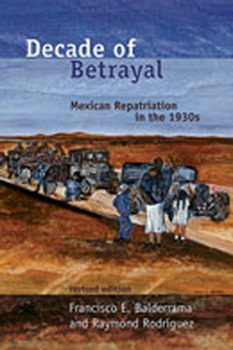Decade of Betrayal: Mexican Repatriation in the 1930s
Select Format
Select Condition 
Book Overview
During the Great Depression, a sense of total despair plagued the United States. Americans sought a convenient scapegoat and found it in the Mexican community. Laws forbidding employment of Mexicans were accompanied by the hue and cry to get rid of the Mexicans The hysteria led pandemic repatriation drives and one million Mexicans and their children were illegally shipped to Mexico. Despite their horrific treatment and traumatic experiences,...
Format:Paperback
Language:English
ISBN:0826339735
ISBN13:9780826339737
Release Date:May 2006
Publisher:University of New Mexico Press
Length:376 Pages
Weight:0.70 lbs.
Dimensions:1.1" x 5.8" x 8.6"
Customer Reviews
5 ratings
An Immigation Shocker!
Published by Thriftbooks.com User , 14 years ago
Change a few dates from the 1930s to the first decade of the 21st century and it looks like we're headed that way again. Oh well, each new generation needs its 'lowlifes' to kick and feel superior to. Its much to easy to forget why their own ancestors came to this country; after all,I got mine made, and YOU cant have any of it.
Excellent Start
Published by Thriftbooks.com User , 19 years ago
Balderrama explores an over looked chapter in American history--the deportation of hundreds of thousands of American citizens of Mexican descent during the Great Depression. Unfortunately, he tries to argue that repatriation was not economically feasible for employers. I say what difference does it make? It's the same old argument we hear now: They do jobs nobody else will do. But what if they didn't? The fact is, the government has no right to deport its citizens, regardless of what they do for a living, regardless of their race/ethnicity/skin color. Thios book is a great start, but more scholarship needs to be done in this area. One of my great uncles, an American citizen of Mexican descent, was deported by the US government during the Depression because they wanted to free up jobs for the dustbowl refugees. To the reviewer who calls this sad chapter in our nation's history a "minor incident," I wonder how he would feel if he were uprooted and taken by the US government to a foreign country. The reason this reviewer thinks something this huge is a "minor incident" is that he doesn't view people of Mexican descent as truly American. He sees anybody of Mexican descent as foreign even if they are American citizens just like him and therefore thinks it's no big deal for them to have been deported. Many of the American citizens who were deported had never been to Mexico and could not Speak Spanish. But even if they could, they were still AMERICANS and had every right to live and work in the United States, the nation of their birth, as much as any other American citizen.
Read before you review, please
Published by Thriftbooks.com User , 19 years ago
I am wondering whether a few of the other reviewers have actually read Balderrama's book. I haven't finished it yet, but even I have figured out that Balderrama and Rodriguez are writing about how not only Mexican nationals were 'repatriated,' but also US-born, US citizens who happened to be of Mexican ancestry (and most likely not pale-skinned enough). One of the principal questions the authors pose is: what is the relationship between legal citizenship and cultural citizenship? In other words, if even citizens get deported, many to a country they have never even seen, because of their imputed race, what does citizenship even mean? This question is very relevant today given the current scrutiny by ICE of immigrants, legal or not, and by all of DHS of citizens, especially those who fit certain suspect profiles. The most interesting part of the book for me so far is the authors' in-depth look at Mexican families in the US in this period. In particular, their portrait of how families of Mexican descent were stereotyped and misunderstood by both the US and Mexican governments, and how as a result immigration and welfare policies were poorly formulated. It's worth thinking about how government policy can work (directly or indirectly) to either strengthen or break up families--and how many Mexican/American families (by this I mean families comprising people with Mexican and US citizenship) managed to stay together despite the economic and political struggles they faced.
A Great Addition to Mexican-American History
Published by Thriftbooks.com User , 21 years ago
Dr. Balderrama is a great historian. His research into the Mexican repatriation is told magnificently. I also happen to be one of his former students at CSULA. I do remember his class and enjoyed his lectures. Unlike other history professors at CSULA, his style of teaching and lecturing was memorable. His contribution to Mexican American history is invaluable. Great book! *****.
ERacism
Published by Thriftbooks.com User , 21 years ago
I read the review by Michael Sturdevant and think he is probably a racists. I have took classes with Dr. Balderrama and can tell you he is a excellent teacher. He teaches his Chicano students about victimology and how they are victims of white America. This is very true. Some teachers think that Chicanos are struggling to get ahead because they are not as educated as white people. But Balderrama teached us that it is because we are victims that we can't make enough as the white people. That is why Balderrama is suing the US government. Then the Chicano people will have billions of dollars to share with him. And we don't need to get more education. Just more money. I believe in Balderrama, I believe in victimology, and I only wish all Chicanos believed in victimology, then we would all be as rich as the white people.





